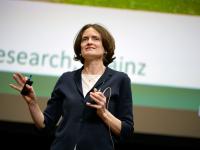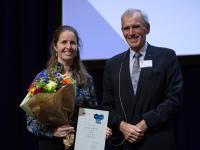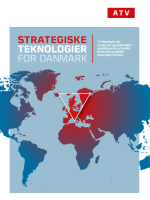Visions in Chemistry - the Torkil Holm Symposium 2024

Sign up for the Torkil Holm Symposium 2024 with presentations of cutting-edge chemistry!
The aim of the Torkil Holm Symposium is to bring together world-leading experts from both academia and industry to present a broad range of topics within the field of chemical science.
The symposium will include presentations on organic synthesis, catalysis, materials science, sustainable chemistry, and chemistry at the interface to biology by the following world-class scientists. Thus, we are proud to present, in first-name alphabetical order:
-
Exec. Dir. Blair Wood, Merck - Biography:
Blair grew up in Alabama and obtained a B.S. in Chemistry from the University of South Alabama. He then moved to Cornell University for doctoral studies in organic chemistry. After completing a postdoctoral fellowship at Harvard University, he joined Merck's Medicinal Chemistry Department in Rahway, New Jersey, in 1996.
Since joining Merck, he has had the opportunity to work across numerous therapeutic areas and be a part of or lead programs for the treatment of diabetes, hypertension, thrombosis, cardiovascular disease, pain and Alzheimer’s disease. These teams delivered six clinical candidates. From these experiences he was mentored in drug discovery from a rich pool of Merck’s talent. In 2016 he moved to the medicinal chemistry department in Kenilworth New Jersey and had the privilege to co-lead the oral PCSK9 peptide program team that discovered MK-0616.
Currently, Blair is an executive director in New Jersey Discovery Chemistry and leads the Therapeutic Modalities group. His team applies enabling technologies and expertise in small molecules, peptides, oligonucleotides and target protein degraders to support our pipeline.In his spare time, Blair enjoys vacationing in the Caribbean islands with his family, cycling and surf fishing at the Jersey shore.
-
Professor Emily Balskus, Harvard University -
Biography:
Emily is originally from Cincinnati, Ohio, where she first became interested in chemistry as a high school student. She graduated from Williams College in 2002 as valedictorian with highest honors in chemistry. After spending a year at the University of Cambridge as a Churchill Scholar in the lab of Prof. Steven Ley, she pursued graduate studies in the Department of Chemistry and Chemical Biology (CCB) at Harvard University, receiving her PhD in 2008. Her graduate work with Prof. Eric Jacobsen focused on the development of asymmetric catalytic transformations and their application in the total synthesis of complex molecules. From 2008–2011 she was an NIH postdoctoral fellow at Harvard Medical School in the lab of Prof. Christopher T. Walsh. Her research in the Walsh lab involved elucidating and characterizing biosynthetic pathways for the production of small molecule sunscreens by photosynthetic bacteria. She also received training in microbial ecology and environmental microbiology as a member of the Microbial Diversity Summer Course at the Marine Biology Lab at Woods Hole during the summer of 2009.
Emily joined the CCB faculty in 2011 and is currently the Thomas Dudley Cabot Professor of Chemistry and a Howard Hughes Medical Institute Investigator. She is also an Institute Member of the Broad Institute of Harvard and MIT. Her research focuses on deciphering microbial metabolism and its role in complex microbial ecosystems like the human gut microbiome. Using chemical knowledge and tools, Emily and her group seek to discover new microbial enzymes and metabolites as well as elucidate their biological roles. Their research program has been recognized with multiple awards, including the 2011 Smith Family Award for Excellence in Biomedical Research, the 2012 NIH Director’s New Innovator Award, the 2013 Packard Fellowship for Science and Engineering, the 2019 Blavatnik Award for Young Scientists in Chemistry, and the 2020 Alan T. Waterman Award from National Science Foundation. -
Professor
Franziska Schoenebeck, RWTH Aachen University
-
Biography:
Franziska Schoenebeck has been a Full Professor and Chair at the Institute of Organic Chemistry at RWTH Aachen University since the summer of 2016. Professor Schoenebeck was born and raised in Berlin, Germany. From 2001-2004, she studied Chemistry at the Technical University of Berlin and the University of Strathclyde in Glasgow, UK. She undertook her PhD in synthetic organic chemistry in the group of Prof. John A. Murphy in Glasgow, UK. In 2008 she moved to California to work with Prof. K. N. Houk at UCLA, where she was involved in computational studies of organic reactivity. In 2010, she joined the faculty of the ETH Zürich to start her independent research program. Three years later, she was appointed Associate Professor at the Institute of Organic Chemistry at RWTH Aachen University and promoted to Full Professor in 2016. Her research program is based at the interface of synthetic organic, mechanistic and computational chemistry with a strong emphasis in homogeneous metal catalysis. Her research has been recognized with several awards and lectureships, including the 2022 Tetrahedron Young Investigator Award, the 2020 Klung-Wilhelmy-Wissenschafts-Preis, the 2014 ORCHEM Prize and Dozentenpreis. She serves the chemical community in various roles, including as Associate Editor at the ACS journal JACS. -
Professor
Hendrik Dietz, Technical University of München
-
Biography:
Hendrik Dietz is a physicist and pioneer in the field of DNA nanotechnology. He has made key contributions to the construction of complex nanostructures, improving the synthesis of DNA structures and materials through faster, more efficient, and cost-effective methods. This work has paved the way for the industrial use of synthetic DNA objects. Hendrik has also been at the forefront of numerous DNA nanotech applications, including molecular motors and new antiviral treatment concepts. He has received several awards for his achievements, including the prestigious Gottfried Wilhelm Leibniz Prize, and holds multiple patents. In addition to his research, Hendrik is an entrepreneur who is dedicated to bringing his academic insights to the commercial market. Hendrik has co-founded tilibit, plectonic, and capsitec.
Prof. Dietz studied physics in Paderborn, Saragossa (Spain) and at the LMU Munich. After completing his doctorate at TUM (2007), he worked at Harvard Medical School, Boston, USA. Dietz has been a professor of Experimental Biophysics at TUM since 2009. -
Professor
Laura Kiessling, MIT
-
Biography:
Laura Kiessling earned a BS in Chemistry from the Massachusetts Institute of Technology and a Ph.D. in Organic Chemistry from Yale University. After two years at the California Institute of Technology as an American Cancer Society Postdoctoral Fellow, she joined the faculty of the University of Wisconsin, Madison in 1991. In 2017, she returned to MIT as the Novartis Professor of Chemistry and Member of the Broad Institute. Her interdisciplinary research interests have advanced our understanding of cell surface recognition processes, especially those involving protein-glycan interactions. Laura is a Fellow of the American Association for the Advancement of Science, and a Member of the American Academy of Microbiology, the National Academy of Sciences, and the National Academy of Medicine. She was the founding Editor–In-Chief of ACS Chemical Biology. Her honors and awards include a MacArthur Foundation Fellowship, a Guggenheim Fellowship, the ACS Gibbs Medal, the Tetrahedron Prize, the Centenary Prize from the Royal Society of Chemistry, and the Ronald Breslow Award in Biomimetic Chemistry. -
Professor
Mogens Brøndsted Nielsen,
University of Copenhagen
-
Professor Mogens Brøndsted Nielsen is Professor and Deputy Head at Department of Chemistry, University of Copenhagen. He obtained his PhD degree from University of Southern Denmark in Odense. After his PhD work, which also included stays at UCLA and Université d’Angers, he did post-doctoral work at ETH-Zürich. He started his independent research career at University of Southern Denmark before moving to University of Copenhagen in 2004. He has been Guest Professor at University of Oregon, Eugene, and currently holds a Liebig Guest Professorship at Justus-Liebig-Universität Giessen.
- Professor Morten Meldal, University of Copenhagen
-
Biography:
Nobel Laureate 2022 and Professor of Chemistry at UCPH. Director of NSC at Copenhagen University 2011-2013. Professor and leader of synthesis at Carlsberg Laboratory in Copenhagen1988-2011. Director 1997-2008 at the SPOCC Center of the Danish National Research Foundation. He has a PhD degree in Chemistry and Biology of Oligosaccharides from Technical University of Denmark. He did his PostDoc in peptides with R.C. Sheppard at M. R. C. in Cambridge. He has received 14 awards and is member or board member of a large variety of scientific societies. He founded Society of Combinatorial Sciences, which he is currently chairing. He has over 340 publications and 28 patents, and his research areas include: Combinatorial chemistry, “click” chemistry, polymer chemistry, organic synthesis, automation in synthesis, artificial receptors and enzymes, nano assays, biomolecular recognition, enzyme activity, cellular assays, molecular immunology, nano scale MS and NMR, encoding. Throughout his career Prof. Meldal has had an outstanding influence on contemporary methodology particularly in peptide- and combinatorial chemistry and has always contributed with innovative and practical solutions to the currently most pressing general problems in these scientific fields. -
Professor
Omar Yaghi,
University of California, Berkeley
-
Biography:
Omar M. Yaghi is the James and Neeltje Tretter Chair Professor of Chemistry at the University of California, Berkeley. He is also the Founding Director of the Berkeley Global Science Institute whose mission is to build centers of research in developing countries and provide opportunities for young scholars to discover and learn, the Co-Director of the Kavli Energy NanoSciences Institute focusing on the basic science of energy transformation on the molecular level, the Co-Director of the California Research Alliance by BASF supporting joint academia-industry innovations, and the Bakar Institute of Digital Materials for the Planet whose mission is integrate artificial intelligence and data science into the basic sciences to solve climate issues and scale solutions globally.Omar Yaghi is an elected member of the U.S. National Academy of Sciences (2019), American Academy of Arts and Sciences (2022), and the German National Academy of Sciences Leopoldina (2022). He has also been honored with many awards from sixteen countries. A selected list includes: Sacconi Medal of the Italian Chemical Society (2004), Materials Research Society Medal (2007), American Chemical Society Award in the Chemistry of Materials (2009), Royal Society of Chemistry Centenary Prize (2010), King Faisal International Prize in Science (2015), Albert Einstein World Award of Science (2017), BBVA Foundation Frontiers of Knowledge Award in Basic Sciences (2017), Wolf Prize in Chemistry (2018), Eni Award for Excellence in Energy (2018), Aminoff Prize by the Royal Swedish Academy of Sciences (2019), August-Wilhelm-von-Hofmann-Denkmünze Prize of the German Chemical Society (2020), Royal Society of Chemistry Sustainable Water Award (2020), Belgium’s International Solvay Chair in Chemistry (2021), VinFuture Prize for Emerging Science and Technology (2021), and the Wilhelm Exner Medal (2023). His research work led to over 325 published articles, which have received a total of more than 210,000 citations (December 2022). He has an h-index of 176 and ranked as one of the most impactful chemists worldwide.
-
Professor
Paolo Melchiorre
University of Bologna
-
Biography:
Paolo Melchiorre is Professor of Chemistry at the University of Bologna since October, 2022. He carried out research at international level working as a Senior Group leader at the Institute of Chemical Research of Catalonia (ICIQ, Spain) for 13 years. He is Associate Editor of Chemical Science, the flagship journal of the Royal Society of Chemistry (RSC). His main research goals are the design and discovery of transformative chemical processes promoted by light that convert abundant chemicals into added-value products while meeting the goal of protecting the environment. Go to the Curriculum vitae -
Professor Tobias Ritter, Max Planck Institute, Mühlheim -
Biography:
Tobias Ritter received his undergraduate education in Braunschweig, Germany, Bordeaux, France, Lausanne, Switzerland, and Stanford, US. He has performed undergraduate research with Prof. Barry M. Trost at Stanford, obtained his PhD working with Prof. Erick M. Carreira at ETH Zurich in 2004, and was a postdoc with Prof. Robert H. Grubbs at Caltech. In 2006, Tobias was appointed as Assistant Professor in the Department of Chemistry and Chemical Biology at Harvard, promoted to Associate Professor in 2010, and to Professor of Chemistry and Chemical Biology in 2012. Since 2015 he is director at the Max-Planck-Institut für Kohlenforschung in Germany and holds additional faculty appointments at RWTH Aachen and Massachusetts General Hospital, Boston. The Ritter lab focuses on late-stage functionalization chemistry, with a focus on fluorination methods and their application to molecular imaging. In 2011, Tobias co- founded SciFluor LifeScience, now OcuTerra Therapeutics, a clinical pharmaceutical company in Cambridge, Massachusetts. -
Professor
Varinder Aggarwal, Unviersity of Bristol -
Biography:
Varinder K. Aggarwal studied chemistry at Cambridge University and received his Ph.D. in 1986 under the guidance of Dr. Stuart Warren. After postdoctoral studies (1986-1988) under Prof. Gilbert Stork, Columbia University, he returned to the UK as a Lecturer at Bath University. In 1991 he moved to Sheffield University, where he was promoted to Professor in 1997. In 2000 he moved to Bristol University where he holds the Chair in Synthetic Chemistry. He has received numerous awards including RSC Perkin Award 2013; Gilbert Stork Lectureship at University of Wisconsin and Pennsylvania, 2016; Humboldt Research Award 2017; RSC Organic Synthesis Award 2017; Kurt Alder Lectureship 2018, Arthur C. Cope Award 2019, the Yamada-Koga Prize 2019, RS Davy Medal 2019, and the Xingda Lectureship Peking University, 2020. He was elected Fellow of the Royal Society in 2012. He has published >350 papers, 18 book chapters and 9 patents. He has an h index of 71.
And a lecture by the winner of the Torkil Holm Prize for 2024
The symposium is now closed for registration.
To sign up, you need to have a profile. If you don't have one, click "Opret profil" and create a profile. If you have forgotten your password, press "glemt password".
If your colleagues have a profile, you can also enlist them. Problems? Write atvmail@atv.dk.
Conference fee:
DKK 1000 for students including PhD students, DKK 3850 for full rate participants.



